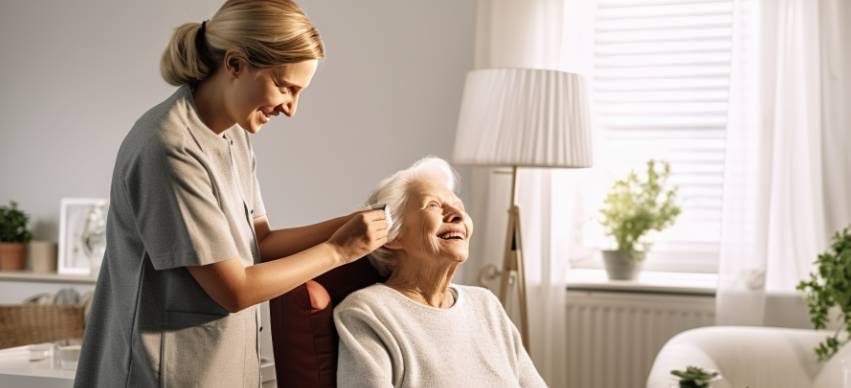How Communities Are Changing the Way We Think About Aging in..
8 Min Read


In recent years, the demand for in-home care for elderly patients has surged. This reflects a broader trend towards more personalized and comfortable healthcare solutions.
As the population ages, the need for care that addresses physical health and nurtures emotional and mental well-being becomes paramount. In-home care offers a unique blend of professional healthcare and compassionate support within the familiar confines of one's home.
This approach not only respects the dignity of seniors but also promotes a more holistic method to their care. In this article, you'll explore the eight benefits of in-home care for elderly patients. Each explains why this option isn't just a luxury but a necessity for many families.
Personalized care is the cornerstone of in-home care for elderly patients. This ensures every aspect of care is tailored to meet the individual's unique needs, preferences, and medical conditions.
In-home care offers the flexibility to design private aged care packages that address everything from basic assistance to complex medical management. This ensures the care provided meets the specific health requirements of the elderly patient and accommodates their lifestyles.
By focusing on the individual, in-home care promotes better health outcomes, increased satisfaction, and a greater sense of well-being among elderly patients.
Home is where the heart is, especially for the elderly. The familiar surroundings of one's own house can deeply comfort and reassure elderly patients. It's about the little things: their favorite chair, the view from their window, or the garden they've tended for years.
Being at home helps maintain their connection to cherished memories and personal history, contributing significantly to their emotional and psychological health. This environment encourages a sense of independence and security, essential for enhancing the quality of life in one's later years.
In-home care emerges as a cost-saving alternative to full-time residential facilities. By customizing services, families pay only for what they need. This approach eliminates the hefty fees associated with round-the-clock care in nursing homes.
Furthermore, in-home care reduces incidental costs, like transportation and hospital visits, by preventing many common health complications. Ultimately, this tailored care model offers significant financial advantages, making it an economical choice for long-term care.
In-home care boosts family involvement in the elderly's well-being. Loved ones can visit any time, unlike in facilities with visiting hours. This flexibility strengthens bonds and improves care quality.
Family members can communicate directly with caregivers, ensuring the elderly's needs are promptly met. This direct involvement reassures families, knowing their loved ones receive care tailored to their preferences and requirements. It's a partnership that enriches the caregiving process, making it more effective and personal.
Patients receiving care at home often exhibit superior health results. This advantage stems from personalized care, reducing the risk of infections common in group facilities.
At home, care routines adjust promptly to health changes, promoting quicker recoveries. Emotional well-being, supported by familiar surroundings, further enhances health outcomes. Studies support these observations, showing that in-home care patients typically face fewer hospital readmissions and enjoy a more sustained improvement in their health conditions.
The in-home care model shines with its unparalleled flexibility. As the health and abilities of elderly patients change, so too can the care they receive. This adaptability ensures that each person gets the right support at the right time.
Whether it's adjusting the number of care hours or accommodating new routines, in-home care adapts seamlessly. This dynamic approach guarantees that elderly care is always in step with the patient's current situation, providing peace of mind for families and patients alike.
In-home care boosts seniors' independence. It allows them to stay in control of their daily activities. Caregivers support only where needed. This means elderly patients can keep doing what they love at their own pace, in their own homes. It's about assistance, not takeover.
This approach respects their autonomy. It promotes self-reliance. Seniors feel capable of maintaining their dignity. Independence is crucial for their well-being. In-home care ensures they don't lose this as they age.

In-home caregivers bring more than skills; they bring heart. These professionals are trained to offer both advanced medical care and emotional support. Their presence ensures that elderly patients receive attentive, expert care tailored to their health needs.
Yet, it's their compassion that truly makes a difference. Caregivers often become like family, offering a listening ear, a comforting word, and a caring touch. This blend of professionalism and empathy creates a nurturing environment for seniors, enhancing their quality of life at home.
Final Thoughts
Embracing in-home care is more than a choice; it's a commitment to enriching the lives of our elderly loved ones. This personalized approach not only safeguards their health but also honors their desire for dignity, comfort, and independence. Let's redefine aging together, ensuring our seniors thrive in the warmth and familiarity of their cherished homes.